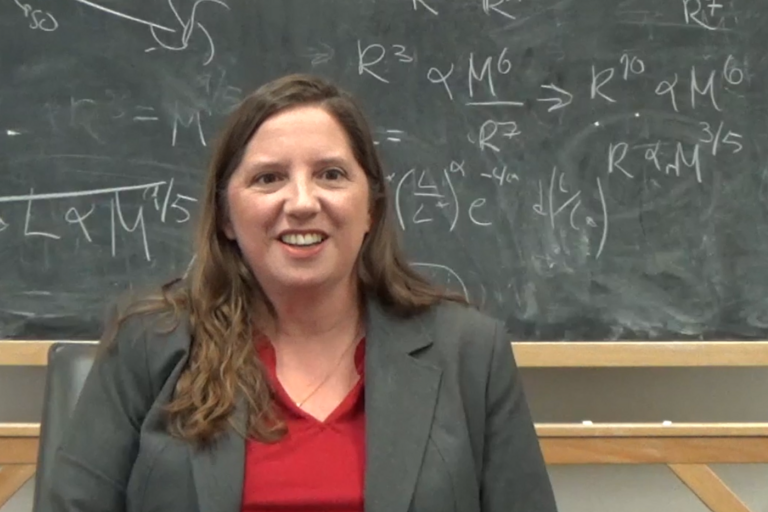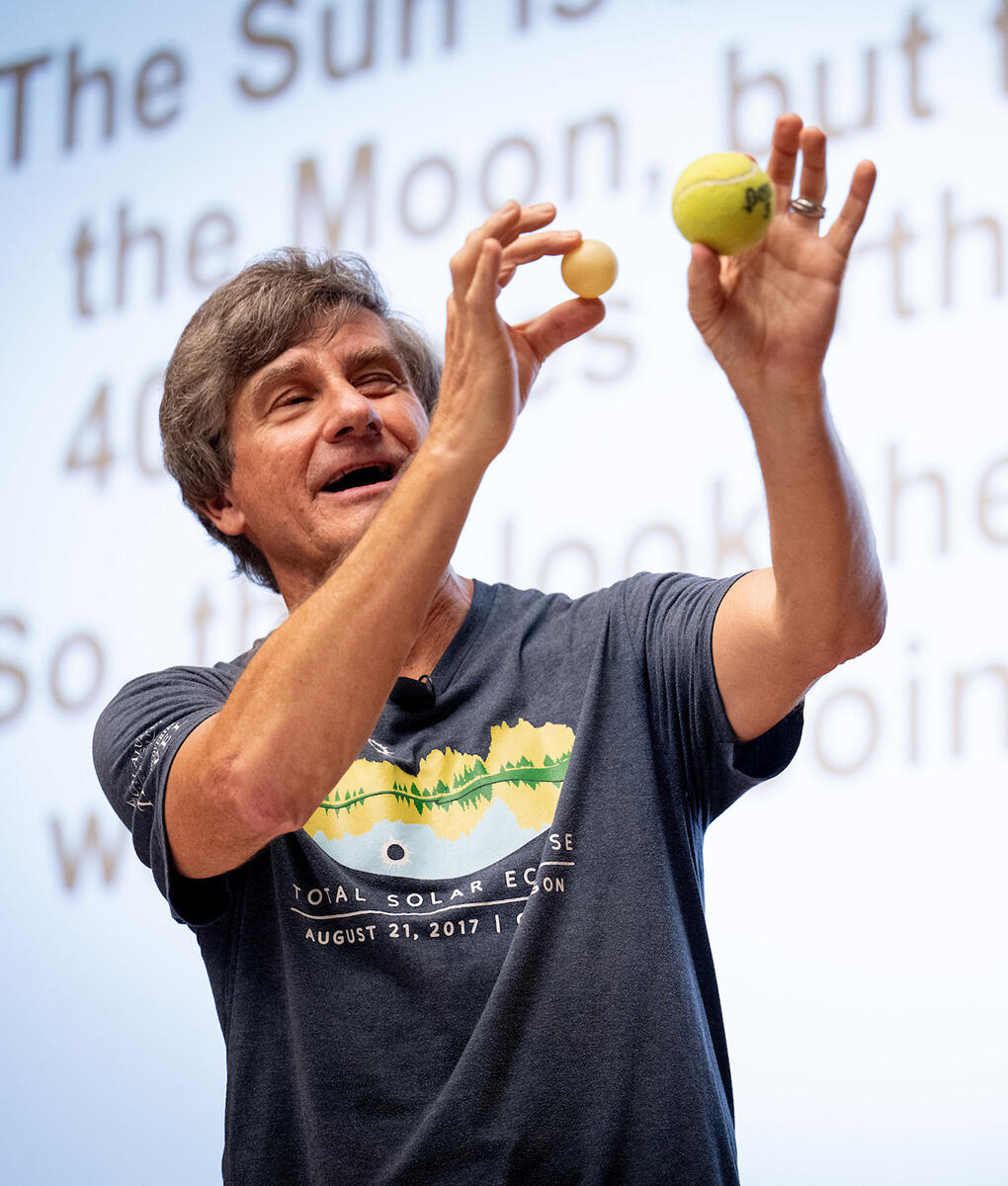Astronomy students who grew up building telescopes for backyard stargazing sessions could hardly find a better instructor than Jessica Lu. An associate professor in the Department of Astronomy, Lu studies black holes and helps design adaptive optics that sharpen images taken with major telescopes like the one at the Keck Observatory in Hawai‘i.
This year, Lu began her first stint as astronomy chair, a role she accepted with surprise.
“I would much rather be sitting at my computer making discoveries about the universe and working with my students all day long," said Lu, "but the former chair, Professor Josh Bloom, really showed why a good department chair is valuable and how important it is to have a leader to steer the ship in times of crisis. I care about the department and want it to be all it can be. If that means stepping up to serve as department chair, then that is something I want to do.”
True to her field, Lu radiates excitement when talking about space, particularly her specialty: black holes. She is currently exploring new avenues for research thanks to advances in data science, precision technologies for manipulating light, and low-cost space access. Lu discussed the future of her department in an interview with UC Berkeley writer Alexander Rony.
What is unique about UC Berkeley’s Department of Astronomy?
The astronomy department is a fantastic place to work. One thing that sets Berkeley apart from other universities is this ability to be both a large, public state school and have an incredible student body that’s diverse and brings all their amazing backgrounds to bear on scientific research. I also love the techy mindset at UC Berkeley. We absorb it from the Bay Area — or perhaps help create it.
When you grow up in a city now, you can’t look up and see the stars every night. It’s amazing that, as astronomy professors and researchers, our ability to communicate what we see in the universe inspires all these new students.
UC Berkeley is in a unique position where we’re not only making today’s high-impact discoveries about the universe but also training the next generation of diverse scientists to take their place in the world as astronomers, educators, policymakers, and engineers. When they leave Berkeley, they’ll depart with their scientific skillset, curiosity, and passion for the universe, and we hope that they carry that on into their next endeavors — wherever that might be.
What is especially promising about the department’s current research projects?
The amount of data that we have access to in the field of astronomy has exploded. The scales are just immense — we’re talking about terabytes of data every night that’s taken with just one telescope. We have to sift through these incredible troves of data to find the cream of the crop, the interesting discoveries that no one else can find. Our ability to take movies of the universe is completely new in the last decade, as is our ability to probe the universe with both light and these ripples in spacetime called gravitational waves.
Right now, there’s an intense focus on black hole studies. Professors Raffaella Margutti, Chung-Pei Ma, Dan Kasen, Wenbin Lu, Alex Filippenko, Josh Bloom, and myself: there’s a huge number of faculty — plus all of the students and postdocs in our groups — who are working on black holes from different angles, whether that’s through theory or observation with the full array of electromagnetic spectrum.
Professors Courtney Dressing and Eugene Chiang and their students are working to understand where exoplanets exist in the universe and whether they can harbor life. Professor Dressing was just selected to co-chair a large international team of scientists planning and designing the next NASA flagship mission, Habitable Worlds Observatory. This mission will enable us to image Earth-like planets around nearby stars in the next 20-30 years.
We have amazing groups in cosmology, stars, and planets. UC Berkeley is also renowned for its time-domain astronomy. For instance, our newest Miller Postdoctoral Fellow, Dr. Yuhan Yao, is studying how stars are ripped apart by supermassive black holes like the one that sits at the center of our galaxy. After these stars are ripped apart, the black hole gobbles up its mass and launches a violent jet so powerful and high-energy it can escape the entire galaxy. It’s pretty fun stuff!
What priorities are important to the department and you, as chair, over the next year?
My most important priority is to continue to grow the department. We have an increasing number of undergraduate students who want to major in astronomy and astrophysics, and we would like to provide research opportunities for all of them. Each of our faculty are already working with about 10 undergraduates on individual research projects, and we’re still having to turn students away. For undergraduates, working at the forefront of research is a transformative experience. They’ll take that with them after they leave UC Berkeley.
We’d like to hire the best faculty and provide them with startup funding to employ the brightest and sharpest students, build the most innovative instruments, and have access to the computational power they need. We would also love financial support to help our students live in the Bay Area.
What are the different telescopes available to faculty and students thanks to their association with Berkeley?
UC Berkeley students, postdocs, and faculty have access to an incredible amount of resources. The combined resources of UC Berkeley, Lawrence Berkeley Lab, Space Sciences Lab, and Lawrence Livermore Lab give our students amazing opportunities to work with some of the best minds in the world.
Our students get to use two of the biggest telescopes in the world at the Keck Observatory on Mauna Kea in Hawai'i. They get to drive the telescope themselves. By the end of the night, you are exhausted, but you’re in command.
That is an incredible experience. It’s one that is rare now. Telescope time is getting harder to come by. It’s more competitive. If you want to use a space telescope, we use the Hubble Space Telescope and the James Webb Telescope — we even build our own. Right up the hill at Space Sciences Lab, we have students developing the COSI project, which will be a gamma-ray telescope launched into space. Our students are going to build the instruments that help discover all kinds of interesting phenomena in the universe that produce gamma rays.
You’ve sold me. Now, I want to go back to college. What experiences do you find particularly rewarding as a professor?
I really enjoy working with students. I love to watch them grow as scientists, as researchers, and as people. I especially like being able to give opportunities to students from underrepresented backgrounds who might not have had such opportunities before Berkeley. I grew up in a fairly financially challenged family. I was a ballerina and went to a public performing arts high school. If you had looked at me, you wouldn’t have thought “scientist” from my background. Somebody took a chance on me. They gave me a shot to go to MIT. They gave me a shot to do research very early on as an undergraduate. One of my favorite parts about being a professor is being able to turn around and give those same opportunities to new students coming in.
I also really enjoy giving talks to my colleagues and the public, and I love watching students give their first talks. Research can often be tedious. It takes a long time to work through the challenges, but it makes everything worth it when you finally reach the point where you have a finding you can put into a talk and tell the story of that discovery.
One of the amazing things about UC Berkeley is that our alumni love to stay connected to the department. Right now, I am working with an alum who is a fellow at the National Institutes of Health towards the end of his career, and yet he wants to come back and take classes at UC Berkeley in astronomy. We have people who have worked in our department for short periods as researchers, undergraduates, or graduate students, and decades later, they want to stay engaged. They want to hear about our new discoveries, meet the students, share their experiences, and revitalize their own passions for astronomy.
It’s thanks to their generous support that we are able to hire some of the best and brightest minds, attract graduate students, grow the number of undergraduates in our major, and send our students and scholars to conferences and telescopes worldwide. I appreciate all the support at UC Berkeley for astronomical discovery and for training the next generation of scientists and educators.




